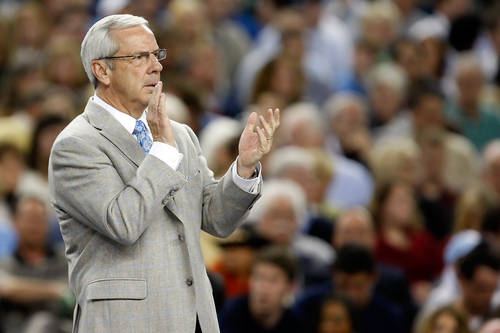Challenging the Narrative: Marcus Paige Has “Unpredictable” North Carolina Rolling
Posted by Chris Johnson on February 28th, 2014College basketball media coverage is predictable. Early in the season, teams become associated with certain narratives. As teams evolve over the course of the season, the narratives may seem less and less apt, but we do our best to hang on to them as long as possible. Some teams don’t change enough to warrant a reconsideration of the way they’re written and talked about. Others change so much, and so quickly, that by February we can’t possibly attempt to re-apply the labels we slapped on them in November and December. Let’s run through some examples.
- Iowa: “KenPom likes ‘em, but they can’t win the close games.”
- Michigan State: ‘Boy, if this team ever gets healthy, it’s winning it all. Mark it down.”
- Kentucky: “So much talent, but not enough leadership.”
- Louisville: “Pitino’s guys can really play, but without Chane Behanan, that frontcourt is going to be an issue come March.”
- And, my personal favorite, North Carolina: “I have no idea what to expect from this team on a nightly basis.”
The origin of the unpredictability the Heels have become known for this season is easy to pinpoint. Over its first nine games of the season, Carolina beat then-No. 1 Michigan State, then-No. 11 Kentucky, and then-No. 3 Louisville. It also lost at home to Belmont (ranked #73 in Ken Pomeroy’s efficiency ratings at the time) and on the road against UAB (#66). This mix of great wins and baffling losses didn’t sit well with us narrative architects. How does one go about describing a team that’s so unpredictable? It was maddening. That’s how Carolina earned its reputation as the most unpredictable team in the country. Trust Carolina at your own peril, was the thought. The only thing we thought we knew about the Heels was how much we didn’t know. Which is to say, a lot.
At the beginning of conference play, when the Heels lost four of their first five games, the narrative shifted. Suddenly, Carolina became very predictable. This team simply wasn’t very good. All those nice wins it notched in November and December felt like an aberration. We were naïve for thinking Carolina could, on occasion, pull off a big win. Things weren’t looking so great off the court, either. Carolina decided not to apply for the reinstatement of P.J. Hairston, its best player – and rental car enthusiast and unofficial mouthguard model and FOF (a title I created and use freely: friend of ‘Fats’). Carolina was used to playing without Hairston, but the running assumption throughout the summer, and at least part of this season, was that he’d return, at which point the Heels would start to resemble the group Associated Press Poll voters pegged #12 in the preseason. Without Hairston, what were the chances the Heels would turn things around?
You don’t need to answer that question, because over the past month, Carolina has done more than turn things around. It has won 10 games in a row to move into fourth place in the ACC and put itself in the discussion for a top-four seed in the NCAA Tournament. Over that span, the Heels are scoring 1.15 points per possession and holding opponents to 0.983 per trip, better than their in-conference averages of 1.08 and 99.0, respectively. These are good times in Chapel Hill (Let’s keep things in perspective). On Wednesday night, Carolina gutted out a one-point win at NC State. Sophomore point guard Marcus Paige scored 31 of his 35 points in the second half and overtime to further validate the nickname, “Second-Half Marcus.”
Paige has been brilliant throughout the Heels’ streak, but Wednesday night in Raleigh wasn’t the first time he’s come up big in the second half. Paige is averaging 17.8 points per game after halftime in the last four games his team has won by single figures, according to ESPN Stats & Information. He had 13 after the break in the Heels’ win over Duke, 16 in their win at Florida State, and 11 in their win at Pittsburgh. Those numbers are impressive in a vacuum. They also speak to Paige’s ability to score when it matters most. So if Paige is not on your ACC Player of the Year radar, start paying attention.
Carolina has three games left in the regular season (at Virginia Tech on March 1, against Notre Dame on March 3, and at Duke on March 8), and it will probably win two of them. But whatever happens from here on out, it would be kind of silly to keep talking about Carolina as a team you can’t trust. I suspect that quite a few people will use that rationale when picking Carolina’s to lose in the NCAA Tournament. Which is fine, really, it is. I’m not picking the Heels to go all the way. Filling out a bracket has never been a rational process, anyway. But if you have watched Carolina during this streak, you know the Heels are anything but unpredictable. They have won 10 games in a row. The narrative architects have been hard at work napalming what they created early in the season. Carolina is a different team now than it was then.














































